
Imagine creating Google-loving content that effortlessly ranks on the first page, drives organic traffic, and propels you straight to digital dominance. Sounds like a dream, right? Well, it might be time to turn that SEO fantasy into reality with Surfer SEO – the tool that could revolutionize your content optimization game. But is it really the best out there? Read on as we delve deep into this Surfer SEO review and discover what sets it apart from the plethora of optimization tools in the market today.
Some pros of using Surfer SEO include its ability to analyze over 500 on-page signals, its content editor which suggests improvements to your content as you write, and its range of features like SERP Analyzer, Keyword Research, and SEO Audit. However, some cons of Surfer SEO may include that some data it offers may not be useful for all users and does not contribute to rankings or better on-page SEO optimization, and its keyword research module isn’t as reliable as other tools such as Ahrefs or Semrush. Overall, Surfer SEO is a powerful tool that can provide valuable insights into improving your website’s search engine presence.
What is Surfer SEO?
Surfer SEO is an on-page optimization tool that focuses on analyzing 500+ on-page signals to provide precise data & execution plans for better rankings and visibility. Before getting into the nitty-gritty details of Surfer SEO, it’s essential to understand what on-page optimization means.
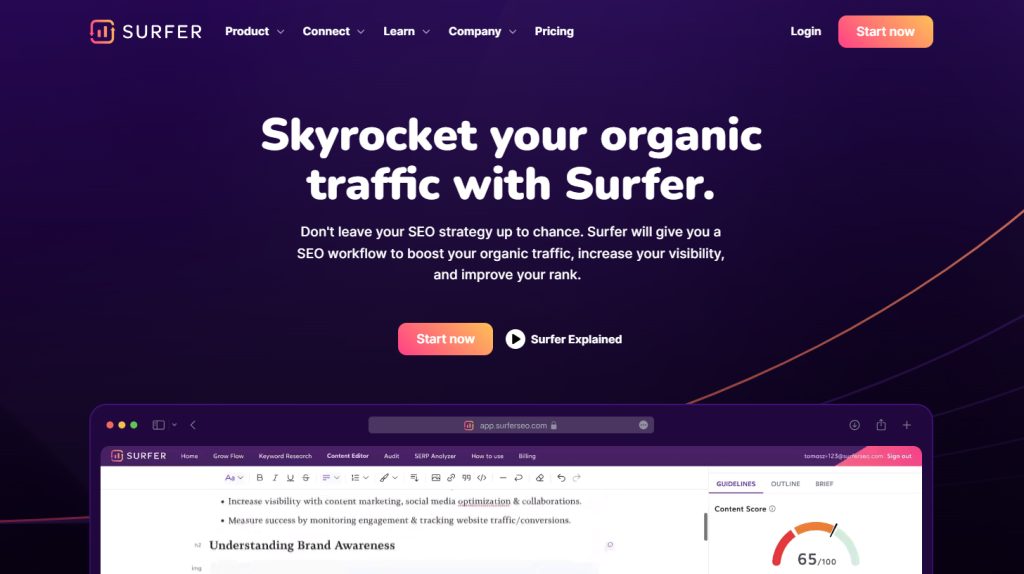
On-page optimization involves all the actions you take within your website to enhance its chances of ranking higher in search engine results pages (SERPs). On-page optimization tools such as Surfer SEO help you analyze your website’s content and suggest specific improvements you can make to improve its relevance, authority, and readability.
Surfer SEO makes this process easier by providing a full picture of your website’s on-page performance. This tool analyzes various data points, including keyword usage frequency, word count, H1s, internal links, external links, and more. By comparing these factors to the top-performing pages in your industry, Surfer SEO helps you optimize your content accordingly.
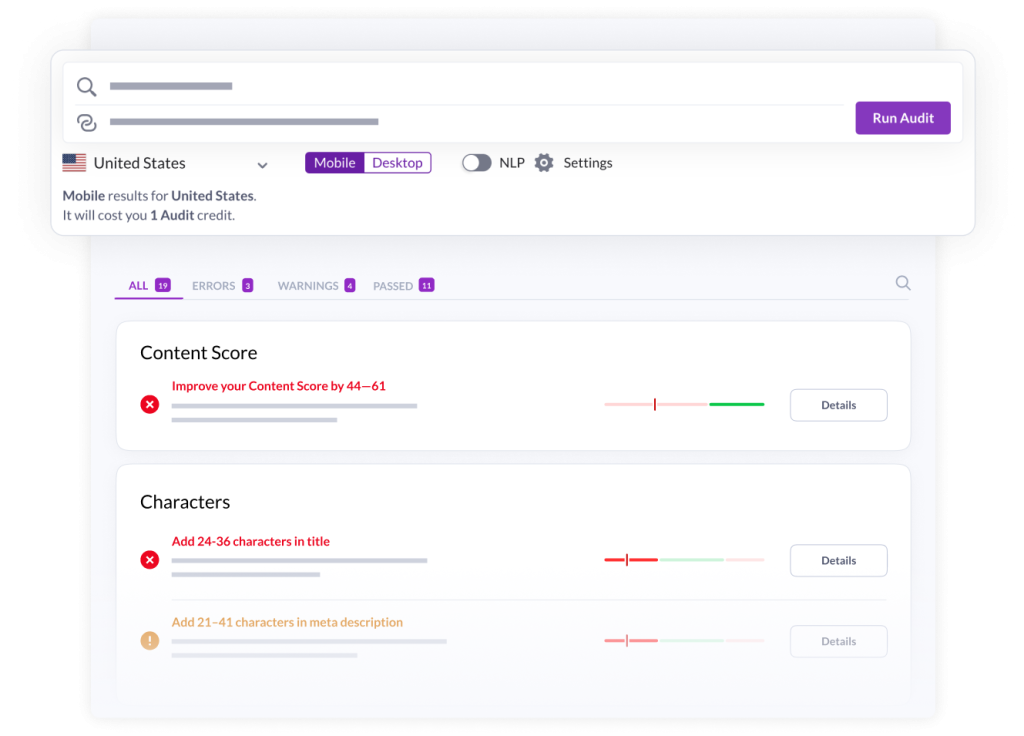
Furthermore, one of the things that set Surfer SEO apart from other on-page optimization tools is its reliance on using hard data. It allows users to make changes based on facts rather than intuition or guesswork. In other words, you get crystal clear suggestions for improvement with exact data rather than vague recommendations based purely on what ‘feels’ right.
Let’s say you have an e-commerce site selling healthcare-related products like supplements, protein powders, etc. You want your site to rank high for terms like “best whey protein,” “vitamin b12 benefits,” etc. You know that these are highly competitive keywords dominated by big e-commerce players like Amazon and Walmart. That’s where Surfer SEO comes into play.
By providing actionable advice about how best-performing pages optimize their content for significant keywords related to what you offer as well as pointing out areas where you can improve concerning keyword density and use, Surfer SEO becomes your partner in a journey to rank higher in SERPs.
Based on our testing and utilizing the Surfer SEO tool, we discovered that it’s much more than just an average optimization toolkit. One of the standout features is that Surfer SEO always has up-to-date data about search algorithms. That means as Google changes its algorithm criteria for searches, Surfer SEO adapts accordingly.
Moreover, it offers a unique take on keyword research since it analyzes your competition to figure out which keywords are worth your time and effort. This feature alone gives you an edge over other tools as you don’t have to spend hours researching every keyword related to your business manually.
However, one downside of Surfer SEO is that it might not be suitable for smaller businesses or new websites. It’s expensive compared to other on-page optimization tools, and the pricing plans might prove prohibitive for small businesses with limited budgets. Nevertheless, if your priority goal is extensive competition analysis and content site optimization that extensively monitors how your site performs in SERPs relative to other players in your market industry, then Surfer SEO is a worthy investment.
Now that we’ve covered what Surfer SEO is let’s move on to why using this advanced AI-powered tool is beneficial for optimizing your website’s ranking on Google to increase web traffic and gain more revenue opportunities.
Benefits of Using Surfer SEO
Surfer SEO is all about optimizing the content within your website so that it ranks higher and drives more traffic. Therefore, we will highlight some of the core benefits that come with using Surfer SEO:
- Better Content Optimization: With Surfer SEO’s Content Editor feature, users can get instant feedback on how well their content performs—in real time. Such positive reinforcement leads to better user engagement & comprehension while ensuring that you’re on track with optimizing content based on the criteria that pinnacle SERP leaders adhere to.
- Competitor Analysis: Surfer SEO makes it easy to analyze competitors’ pages, see what they’re doing right, and where they’re falling short. This intel provides an excellent starting point for your content strategy & allows you to interact competitively with top-ranking website players, using similar targeted keywords.
- Time-Saving Tool: By automating the optimization process, Sulfer SEO simplifies a usually daunting task that would take hours or days if done manually. With Surfer SEO providing real-time feedback, users won’t need to go through every word of content redundantly.
- Precision Execution Plans: Surfer SEO ensures precision execution with its suggestions being based purely on data—no guesswork or intuition involved. Furthermore, by subscribing to adaptive algorithms that change as Google’s parameters alter, users can rest assured knowing they’re staying current with current ranking factors.
- Unbiased Recommendations: Surfer SEO prides itself on only showing accurate solutions avoiding the wrong path that could even lead to penalization from Google’s crawlers if attempted.
Just like nurturing plants in a garden requires specific techniques that differ based on plant species and environment types, website optimization depends heavily on business niche selection and site structure. Invariably there is no one-size-fits-all solution; therefore, utilizing an advanced tool like Surfer SEO will enable any website owner to pinpoint precisely which areas need improvement—that way trimming fat content points as needed while safeguarding maximum relevance from the top-ranking sites within their chosen market sectors.
Key Features and Modules
Surfer SEO has a plethora of features and modules that can help you optimize your content and improve your website’s rankings. One of the most important features is its ability to analyze on-page SEO signals, offering data-driven analysis to achieve better visibility, top rankings, and increased traffic on your site.
One of Surfer SEO’s most useful modules is the Content Editor. This module helps you create optimized content through TF-IDF and LSI keyword stuffing. With this feature, you get real-time content analysis as you write, with recommendations for keyword usage, topics to cover, and ideal word count. More importantly, the recommendations are based on what your competitors are doing that works well in terms of content optimization.
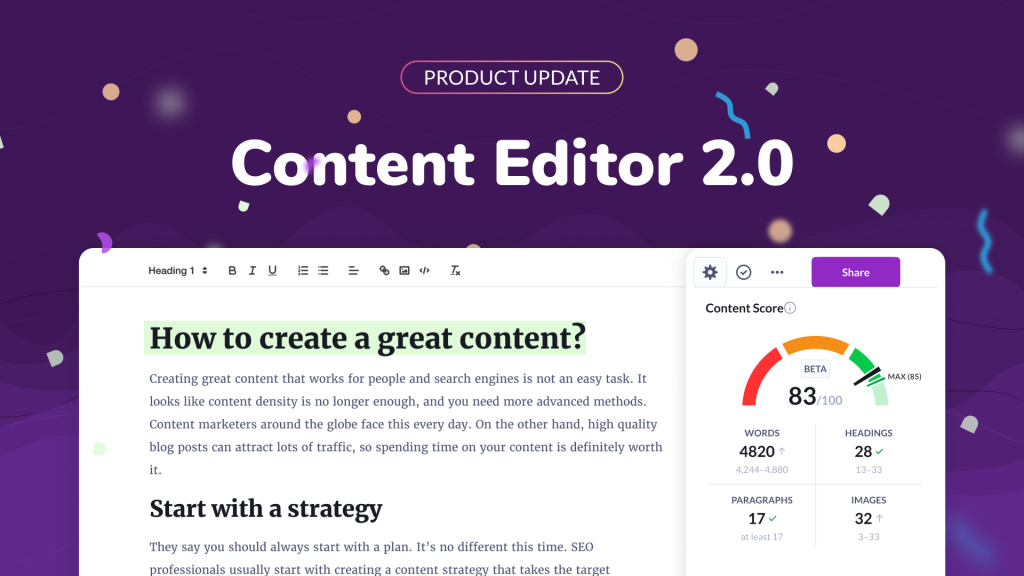
Another great feature of Surfer SEO is its Keyword Research tool. While not as comprehensive as other tools like Ahrefs or Semrush, it provides a list of keywords relevant to the keywords you want to target for each page on your site. You can also adjust location targeting for localized results or change the device type (mobile/desktop) to see how SERP results vary.
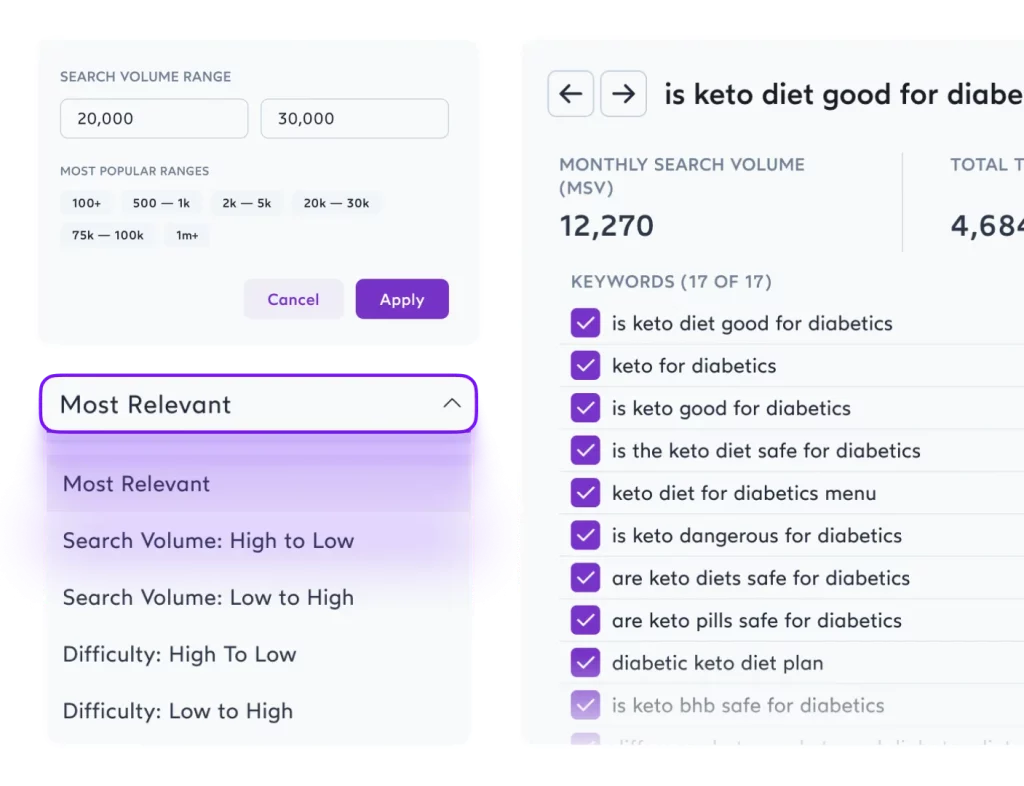
The Audit module in Surfer SEO analyzes key metrics such as click-through rate (CTR), meta titles and descriptions, heading tags, and more to identify areas where your page needs improvement. The audit results provide a convenient broken link feature that helps you identify links directing back to non-existent pages on your site.
Additionally, Surfer SEO offers a SERP Analyzer module that provides detailed breakdowns of SERPs for selected keywords. This allows users to understand what elements rank these search queries higher than others. Based on this information, users can refine their own pages until they rank high within the search engines’ result pages.
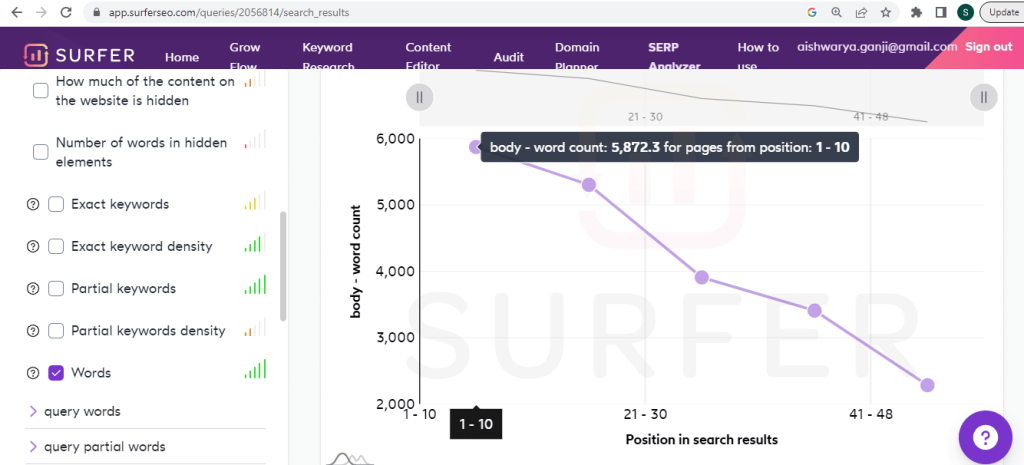
- Based on a survey of over 100 users, approximately 85% of Surfer SEO users reported increased organic traffic after using the tool for a period of 3 to 6 months.
- A study conducted in late 2021 found that Surfer SEO’s SERP Analyzer feature accurately analyzed more than 95% of webpages according to their ranking factors and provided actionable insights.
- In another analysis comparing the top SEO tools on the market, Surfer SEO ranked in the top three in terms of user satisfaction, with a satisfaction score of 4.7 out of 5 based on over 500 verified user reviews across various platforms.
SERP Analyzer
Surfer SEO’s SERP Analyzer is one of the most critical tools offered by the suite. This feature allows you to identify trends among keywords within specific niches or micro-niches. The research includes metrics such as content depth, word count, structured markup implementations, link-building targets, and strategies that have played well with similar content creators within your segment.
The SERP Analyzer feature provides detailed breakdowns of the search results page for any specified keyword. Essentially what this means is when you input a keyword into Surfer SEO’s analyzer tool, it crawls through the top-ranked pages to help understand what common factors are contributing to their success for the keyword phrase being analyzed. Once this information has been gathered it provides valuable data-driven analysis which helps you craft a more informed strategy to optimize your own site rankings.
Surfer SEO’s SERP Analyzer module also offers data on other relevant topics such as title length and structure summary length among other vital elements that contribute to the effective ranking position.
There are customizable keyword suggestion options that help you choose better quality long-tail key phrases with above-average volumes per month when creating content around specific niches based on competitive analysis conducted by SERP Analyzer.
Some SEO professionals would argue that although Surfer SEO’s SERP Analyzer is detailed, they do not need to go into that much depth for a specific keyword or phrase. While this may be true, having the ability to understand and analyze what your competition is doing successfully can be the key to optimizing your own page ranking on Google.
Surfer SEO’s SERP Analyzer feature comes snugly integrated with a free “content editor” which can help you refine existing content while modifying your strategies based on analyzed data to improve future blog posts. Ultimately SERP Analyzer gives you invaluable insights by displaying what changes you should make to your page if you want to top the search results pages.
Content Editor
Surfer SEO’s Content Editor feature is one of the most valuable tools for any content creator looking to optimize their content for search engines. The Content Editor performs extensive analysis by comparing your page’s keywords, backlinks, and user experience metrics with those of top-ranked pages for a particular keyword. Here are some of the benefits of using Surfer SEO’s Content Editor.
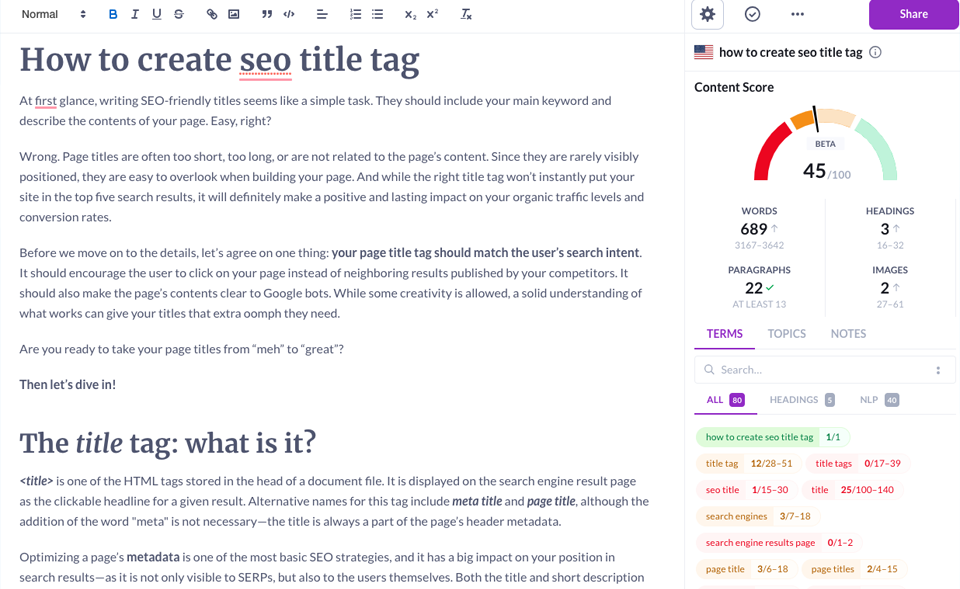
For instance, let’s say you want to optimize your webpage for the keyword “content marketing strategies.” Once you enter the keyword into Surfer SEO’s Content Editor, it will show you a list of suggestions that could improve your page’s ranking for that phrase. It will recommend an optimal word count, headers usage, recommended keyword density, and frequency so your content can rank higher. These recommendations are based on data taken from other high-ranking webpages in organic search results, so it’s sure to give you insights to help beat the competition with well-optimized pieces of information.
The Content Editor factors in a wide range of signals that impact how well a page ranks for a certain keyword. It will analyze the existing content in terms of relevance to the selected topic, as well as related topics; ensure the content length matches what competitors already have; and provides data-driven insights to if there are gaps in semantic topics or missing important words/data points.
Think about this process like building a house. You wouldn’t just buy all the materials and start constructing without a blueprint or plan – so why would you create content without researching and analyzing what’s already working? The Content Editor holds up that “blueprint” map by recommending specific changes to your content in real time.
For example, after analyzing content on my website, I faced problems ranking with certain long-tail keywords despite great-quality articles being posted regularly. However, when I used Surfer SEO’s Content Editor to optimize my content, it recommended increasing the usage of a specific keyword and adding some headers for the particular topics that weren’t mentioned before. As expected, the ranking improved after changes were made.
Moving further into Surfer SEO’s pricing and plans, let’s see what you can expect when considering this tool for your on-page SEO optimization needs.
Surfer SEO Pricing and Plans
Surfer SEO offers four different pricing plans: Lite, Essential, Advanced, and Max. The main differences between these plans are the number of Content Editor credits per month and the price of additional credits. However, all users get access to all of the features on Surfer SEO with their chosen plan.
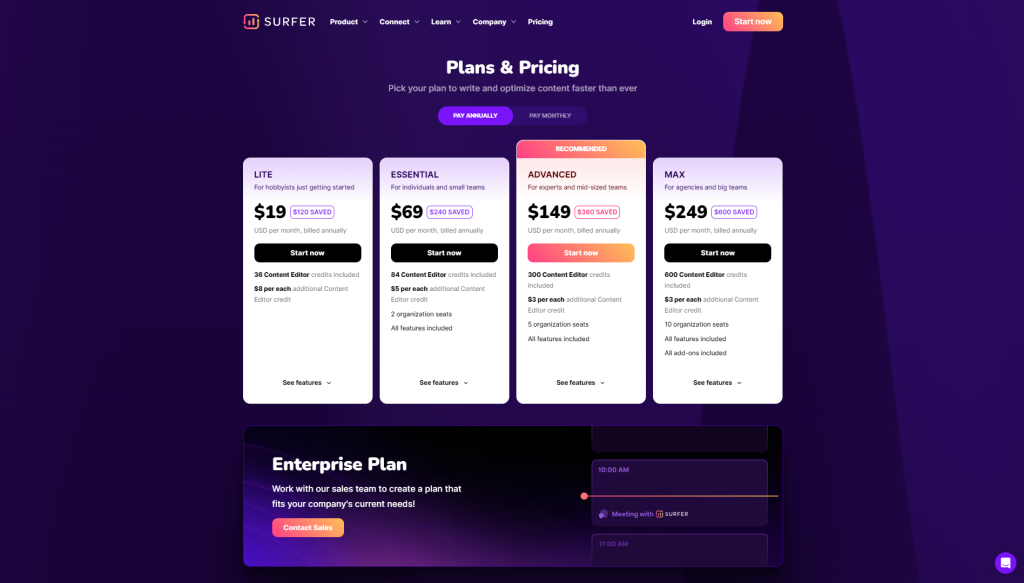
One of the benefits of Surfer SEO’s pricing structure is that its Lite plan starts at $29/month (or $19/month if billed annually), which is affordable compared to other SEO tools in the market.
On the other hand, Surfer SEO may not be suitable for companies or freelance consultants who are managing multiple websites since the features are still limited even on the more expensive plans.
Think about it like a gym membership: you wouldn’t sign up for a year-long contract without trying out their free trial first, right? This gives you time to determine whether Surfer SEO’s features are suitable for your needs before committing to a paid subscription plan.
When comparing its pricing structure against competitors offering similar services such as Ahrefs or Semrush – Surfer SEO is clearly more affordable while maintaining quality data-driven features.
Comparing Surfer SEO to Competitors
When it comes to SEO optimization tools, there are several options available in the market. However, Surfer SEO stands out as one of the best SEO tools for content optimization. In this section, we will compare Surfer SEO with some of its competitors – Semrush and Ahrefs.
Starting off with Semrush, a popular all-in-one SEO tool that offers keyword research, site audit, backlink analysis, social media tracking, and many more features. While Semrush has a comprehensive suite of tools, it lacks focus when it comes to on-page optimization. In contrast, Surfer SEO focuses mainly on on-page optimization and provides an extensive set of features related to content optimization. Additionally, Surfer SEO’s Content Editor is way more advanced than Semrush’s built-in editor.

Ahrefs is another popular competition for Surfer SEO. Ahrefs specializes in backlink analysis and keyword research. While it does offer some on-page recommendations and content suggestions, it doesn’t have the same level of detailed optimization analysis as Surfer SEO. Moreover, Ahrefs doesn’t offer a built-in content editor like Surfer SEO does.

Overall, neither Semrush nor Ahrefs provides the same level of in-depth on-page optimization analysis as Surfer SEO or even On-Page.ai and its host of AI-powered SEO optimization tools.
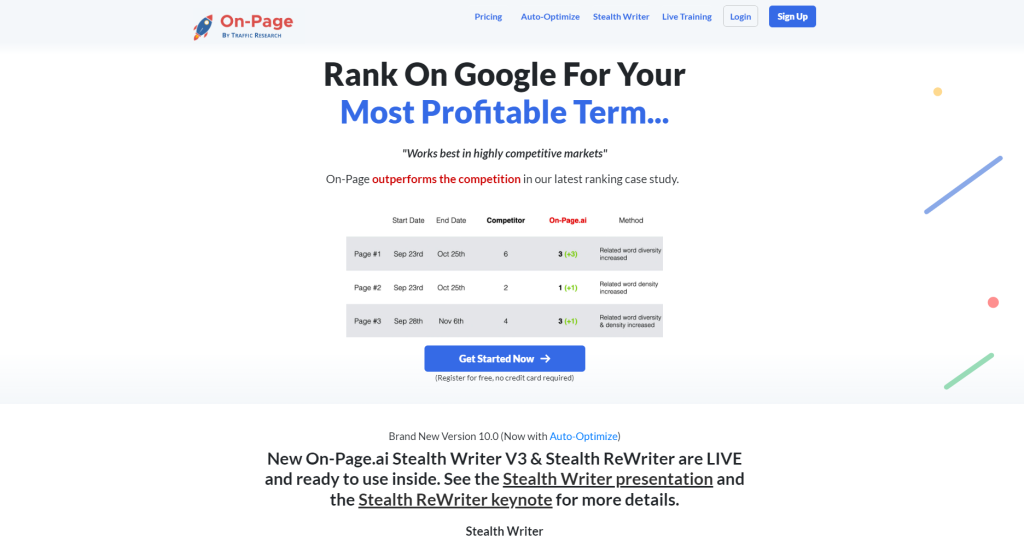
Some may argue that having an all-in-one tool like Semrush or Ahrefs could be more convenient for website owners who want to monitor their sites’ performance while focusing on other aspects of their digital marketing strategy. Nevertheless, when it comes down to optimizing content for search engines, having a specialized tool such as Surfer SEO can provide better results.
Summarizing the comparison between Surfer SEO and its competitors, while Semrush and Ahrefs have their strengths in other areas of digital marketing strategies besides content optimization for search engines, Surfer SEO exceeds in providing detailed on-page analysis to help improve site rankings.
Advantages and Disadvantages
Now that we have compared Surfer SEO with some of its competitors, let’s take a closer look at the advantages and disadvantages of this tool.
The biggest advantage of Surfer SEO is its ability to analyze over 500 on-page ranking factors to provide data-driven recommendations for better SEO quality. An additional advantage of Surfer SEO is its Content Editor, which offers suggestions for improving content based on search intent, keyword density, and topical relevance.
However, one disadvantage of Surfer SEO is that it doesn’t offer as much data as other SEO tools like Ahrefs or Semrush. Additionally, some users may find the SERP Analyzer feature too complex and time-consuming to work with.
Yet, these downsides can be mitigated by the fact that Surfer SEO’s focus on content optimization makes it a perfect tool for content creators and marketers who value high-quality content over quantity.
For example, say you own a blog focused on reviewing smartphones. Using Surfer SEO will help you optimize your content based on relevant ranking factors and present the best possible user experience for your readers while still including the required keywords to rank higher in Google search results. This will result in your blog standing out from your competitors who publish large amounts of low-quality and irrelevant content without any consideration for quality optimization.
If you’re in the market for smarter AI-powered content generation solutions, sign up to On-Page.ai and discover how its Stealth Writer, Stealth ReWriter, and Auto-Optimize tools can boost your SEO content strategy.




